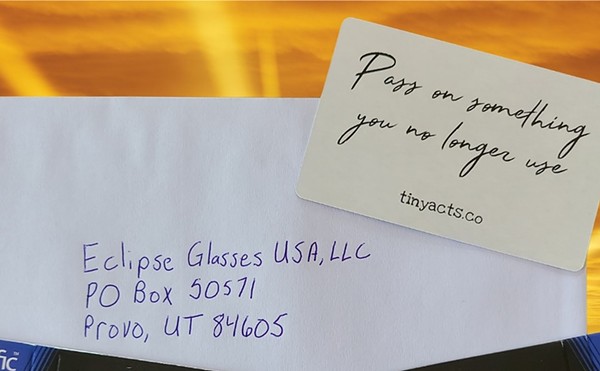Sometimes it seems as if they fall from the sky, in every imaginable
shape and size and color and genre. Science fiction, crime thrillers,
country cookbooks, fantasy epics, romance, how-to and many a memoir
of dubious provenance.
Susan Watson of Borders says she gets nearly one a day (maybe 20 per
month), many from people walking in right off the street. They are
self-published books, and the authors are intent on finding attention
(and distribution) for their efforts.
With the digital age in full bloom, self-publishing and desktop
publishing have quietly established a presence — albeit an innocuous
one — on the menus of American readers. Some self-published books are
good, some bad and some downright ugly, and as of yet there seems to
have been no surprise star. Numbers, for both circulation and
accounts payable, are hard to come by and of questionable accuracy.
But above and beyond issues of profit and loss, there is no doubt
self-publishing is an ongoing phenomena. At this point, almost anyone
can have a manuscript published, regardless of merit.
Local booksellers have mixed opinions about the recent flood of self-
published books. Typical complaints center on the relatively high
price of the books and a consistent program on non-promotion.
“Marketing is almost never a priority (with on-demand publishers),”
says Watson, a buyer of locally authored books for Borders‘ Fourth
Street location. However, she notes that certain titles have sold
well; overwhelmingly, they tend to be non-fiction volumes with a
strong local theme (David Domine’s “Ghosts of Louisville” is one).
“Perhaps,” Watson surmises, “because a lot of our customers are
tourists who want a book that is also a souvenir.”
She sees novels frequently, but most are unsellable because they lack
a UPC symbol for electronic price reading and an ISBN number (the
code number that certifies the book’s publication, copyright,
presence in the Library of Congress and International title
identification data bank).
Having no ISBN nor UPC code is the kiss of death. Watson will not buy
a book to put on sale at Borders unless it has an ISBN number.
Not your mother’s vanity press
While large, established mainstream publishers grow increasingly
reliant on gossipy celebrity tell-alls and hopelessly pedantic rose-
tinted historical volumes best suited for holding doors open, on-
demand publishing and desktop publishing, the new forms of self-
publishing, have evolved. They are distinguished in a few ways from
the traditional “vanity press.” A vanity press like Vantage in New
York, for example, charges writers a substantial upfront fee and
prints any manuscript offered by any writer able to pay that fee. On-
demand publishers often “front” the initial printing costs to the
writer, charging nothing initially but recouping costs by paying the
writer a royalty (per-book) rate so tiny as to be minuscule. Unless
the writer scores a hit — which is, of course, highly unlikely — he
or she pretty much gets exploited either way. In the future there
will likely be some new paradigm for publishing novels (particularly)
whereby self-publishers and tiny publishers, the ones formerly called
“boutique publishers,” fuel the market. Just don’t call it a “vanity
press.”
Those who’ve done it
Despite booksellers’ aversions to self-published works, there is
certainly no shortage of new titles, local, national and international.
Ben Woods, 29, is a local with tales to tell. His book “The
Developers,” a 342-page comedic whodunit based on the 1990s Internet-
startup phenomenon, has been out for nearly a year. Woods has been
through a real wringer — selecting an honorable publisher, haggling
over design and marketing (his book utilizes some non-traditional
alphabetic characters — icons, if you will) and begging for help with
publicity. His efforts have borne fruit: He’s sold about 200 books so
far, and has managed to book five bookstore appearances in Kentucky
and Indiana since the beginning of the year.

Only after two years of writing “The Developers” did Woods even begin
to look for an agent or publisher (he began the book in 2002). The
response was equivocal, and so a glance toward the nascent world of
self-publishing seemed prudent.
“They wanted to charge me too much for stuff like layout and
pagination,” Woods says, “when I had planned to do this myself.
“Most just want you to send them the text, and you can buy
(additional services) from them a la carte. I checked with a couple
of print shops, but the prices were way too high, plus I needed an
ISBN. I performed a lot of Google searches for agencies, printers and
self-publishing. Specialty press prices were cheaper and I could
obtain an ISBN. I decided to go with King Printing/AdiBooks — good
price, knowledgeable about the business and the Web site presentation
was good.”
This, however, was only the beginning of the process. Woods did his
own layout and design, as is only apt for the author of a book about
a start-up Internet company. He still had an endless succession of
problems and adjustments related to packaging and bookkeeping.
Mark Ian Wilkerson of Prospect had a less stressful experience — if
you can call a nine-year-long labor of love less stressful.
Wilkerson, 32, recently finished and then self-published an
exhaustive 628-page biography of Pete Townshend, “Amazing Journey,”
with Lulu Books in North Carolina. The press charges him $17 per
copy; the customer pays $27, and Wilkerson and Lulu split the $10
profit at about 80/20.

The beauty of the setup is that no front money needs to change hands.
Unless the author wants a stash of his own books to sign and sell, no
copy is printed until an order comes in. All commerce is done online,
so tracking sales and other bookkeeping tasks are almost automatic.
Wilkerson simply sent cover artwork and a complete text, each in the
form of a PDF file. He makes it sound quite easy until reminding me
that the research took nearly a decade.
“The book in its present form is really my version of an advance
copy,” he says. “Thus no ISBN or UPC. In another four to six weeks,
I’ll add positive review quotes to the back cover, plus the ISBN, a
UPC and a Library of Congress number. Without the UPC/ISBN, I can’t
sell in stores. Without the Library of Congress number, I can’t sell
to libraries. I’ll then purchase a distribution deal from my
publisher, www.lulu.com, which will make the book available through
Amazon and Barnes and Noble(.com), and will list the book through
various distributors. At that point I will promote the book
aggressively, and will approach local booksellers to see if they’re
interested in selling it.”
So far his efforts have not yielded a royalty check, since
technically the book has not been released yet. He is, however,
sending out the above-mentioned promotional copies and says he has a
shot at being reviewed by Mojo, the prestigious British music mag.
Don Decker is another Louisvillian, who at 70 years old has a tale to
tell and a book that tells it. Decker is known to some folks who run
into him routinely down at Fourth Street Live, where he works at TGI
Friday’s. Decker’s experience with publishing is at once less
stressful than Woods’ and less cavalier than Wilkerson’s. Decker is,
after all, not writing a novel or a paean to his favorite guitar
player. He has written his life story, a frightening and difficult
tale of a life spent as an entertainer, bail bondsman and would-be
bank robber. His 558-page book, “Forfeiture,” is a journal of 30-plus
years as a mid-level criminal and addict and the measures he took to
remove himself from that sort of activity.
While Decker’s deal with PublishAmerica does not require him to put
up front money, the publisher can recoup that by paying a low royalty
rate. Still, Decker is relatively happy with his published book,
although he hates the cover art and wonders why the price has to be
so high — $35.
Promoting work in the new vanity press
When it comes to promotion, self-published authors are definitely at
a disadvantage. Marketing for many of these books is either based on
word-of-mouth (which can sometimes be effective) or else is non-
existent (never a good thing). Woods lists sales to friends and
family members as important targets. Obviously this is not the most
direct path to The New York Times bestseller list.
In fact, the realm of so-called vanity publishing (a term self-
published authors disdain, by the way) has yet to issue forth
anything like a literary or commercial superstar. Inquiries at local
bookstores drew silence on the subject of breakout self-published
authors. It seems that in a world where anyone can get published,
almost everyone does. This may serve to increase the power and
importance of the old-style publishers whose imprimatur may be more
helpful than ever in separating a particular title from the rest of
the pack. This may even explain the continued existence of smaller —
but still old-model, numbered-print-run — publishers (such as
Louisville’s Sarabande, or Published in Heaven), which manage to
thrive while selling only minimal copies of their titles.
In the end, the road of the self-publisher is a lonely one, it seems,
but so, perhaps, is the road of any writer. The newest technology
allows almost anyone to put out a book; obviously this is a boon to
the novice novelist (or non-fiction author, for that matter), but it
can be a mixed blessing for the reader. As on-demand publishing takes
hold, the range of available titles increasingly attests to a more
democratic menu of books, a more turbulent pool of public voices. It
doesn’t necessarily mean that more good books are going to be
printed. It does certainly mean that more diverse books will be
printed, but the reader will still have to look hard and dig deep.
NOTE: Ben Woods will read from and sign copies of his book, “The
Developers,” at 4 p.m. Sunday at Carmichael’s, 2720 Frankfort Ave.
It’s free. Call 896-6950 for more information.
Forfeiture
by Don Decker
PublishAmerica
$34.95
558 pp.
A harrowing tale
Dan Duncan grew up in a vaudeville family, became a singer with
ambitions aimed at Broadway, changed vocations, became a bail
bondsman and a drug addict and then got arrested robbing a bank
(under truly bizarre circumstances). Duncan is the fictionalized name
of local author Don Decker, whose strange and frightening memoir,
“Forfeiture,” is in bookstores (some of them, anyway) now. Perhaps
Decker is best known for his post-prison gig here in Louisville: he
works as a greeter/host most nights and afternoons at Fourth Street
Live and is decked in fancy jacket and top hat that have garnered him
the nickname “the Colonel.”
Decker says he changed the names of the characters in “Forfeiture” to
“protect the guilty.” That is surely an exaggeration — not everyone
in the book is a scoundrel — but perhaps a good idea just the same.
His Dan Duncan stumbles through a lot of muck before settling in
Louisville in his 60s.

terribly well-written. Decker is not a great writer by any stretch
but he is a good writer, sometimes very good. What he has, though —
and a formidable weapon it is, indeed — is a story so harrowing and
so incredible and so totally removed from the mainstream that it will
amaze and thrill almost anyone from any walk of life who picks up and
reads the book. It takes a great man, not a great writer, to walk
away from a life like Decker’s and embrace the tedium and anonymity
of the so-called “straight life.” Decker has done that, and his book
will demonstrate it sure wasn’t easy.





